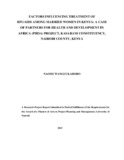| dc.contributor.author | Kahoro, Naomi W | |
| dc.date.accessioned | 2016-11-16T12:59:55Z | |
| dc.date.available | 2016-11-16T12:59:55Z | |
| dc.date.issued | 2015 | |
| dc.identifier.uri | http://hdl.handle.net/11295/97472 | |
| dc.description.abstract | This study sought to establish the factors associated with ART adherence among married women in
Kenya. This study used a cross-sectional survey research design owing to its ability to allow quantitative
and qualitative data from a large population. The target population of this study comprised of all married
women living with HIV in PHDA project, Baba dogo health centre, Kasarani Constituency, Nairobi
County. This study used two instruments; a questionnaire and an interview schedule. Quantitative data
was analyzed using descriptive and inferential statistics. Content analysis was used to analyze qualitative
data. Inferential statistics such as Pearson chi-square test were used to analyze quantitative data. The
study found that there is a statistically significant association between informing spouse HIV status and
adherence to ART program. The study established that there is a statistically significant association
between having a treatment buddy and adherence to ART program. The study found that there is a
statistically significant association between self esteem after knowing HIV status and adherence to ART
program. The study established that there is a statistically significant association between society's
attitude towards people living with HIV and adherence to ART program. The study revealed that there is
a statistically significant association between the extent ARVs side effects affected married women living
with HIV in Baba Dogo daily life and adherence to ART program. The study found that there is a
statistically significant association between problems experienced in dietary requirements of ART and
adherence to ART program. The study established that there is a statistically significant association
between perceived ease of ART program by the respondents and adherence to ART program. The study
has shown a statistically significant association between empathy of healthcare providers and adherence
to ART program. The study revealed that there is a statistically significant association between nature of
communication with healthcare provider and adherence to ART program. The study also revealed that
there is a statistically significant association between healthcare providers’ know-how as perceived by
married women living with HIV in Baba Dogo and adherence to ART program. Adherence to ART
program by married women living with HIV in Baba Dogo as measured by number of missed doses for
one week was found to be 73.6% and for two weeks was 67.9% while adherence to ART program for four
weeks was 35.8%. This study concluded that informing spouse HIV status and having a treatment buddy
have been shown to promote adherence to ART program. Being accompanied by spouse or not among
married women living with HIV does not have an impact on adherence to ART program. This study
concluded that stigma has reduced as majority of married women living with HIV in Baba Dogo have not
experienced prejudice based on their HIV status. Reduced stigma has led to high self esteem even after
knowing their HIV status among married women living with HIV. The fact that married women living
with HIV in Baba Dogo have termed society’s attitude towards people living with HIV as positive serves
to show reduced stigma. This study concluded that high self esteem encourages adherence to ART
program. This study concluded that ARVs side effects affected married women living with HIV in Baba
Dogo daily life either to a little extent or not at all. This study concluded that ART program is easy or
moderately easy to adhere. This study concluded that healthcare providers at Baba Dogo health centre
have empathy as they were described by married women living with HIV in Baba Dogo as either
compassionate or very compassionate. The same apply to communication between patients and healthcare
providers as well as perceived healthcare providers’ know-how by the patients. The study concluded that
adherence as measured by self report matched adherence measured using missed doses for one and two
weeks but differed with that for four weeks. This could be attributed to recall bias among the studied
population. This study recommends that married women living with HIV should be encouraged to inform
spouse their HIV status and have a treatment buddy to enhance adherence to ART program. Although
stigma has reduced, the government through the Ministry of Health and other stakeholders should sustain
efforts to ensure it does not recur as it can negatively affect adherence to ART program. Ease of drug
regimen has encouraged adherence to ART program hence manufacturers and researchers should put
more efforts towards even easier drug regimens. Patient-healthcare provider relationship should be
positive as it can affect adherence to ART. Healthcare providers should be compassionate and ensure
good communication with their patients. The healthcare providers should also be knowledgeable as the
perception of patients on their know-how can affect adherence to ART. | en_US |
| dc.language.iso | en | en_US |
| dc.publisher | University of Nairobi | en_US |
| dc.title | Factors influencing treatment of HIV/aids among married women in Kenya: a case of partners for health and development in Africa (phda) project, Kasarani constituency, Nairobi county, Kenya | en_US |
| dc.type | Thesis | en_US |

